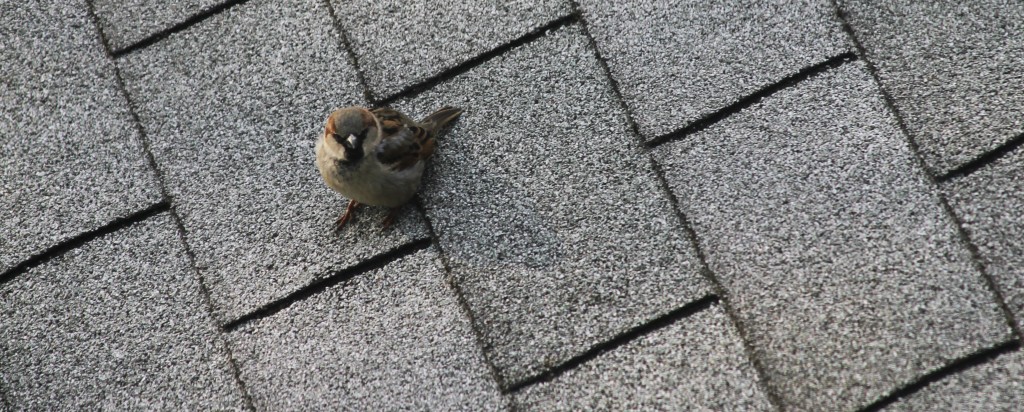She is plump, bright-eyed, bob-headed, brown-feathered. She is hungry. She is hunting rice. Rice doesn’t come easy; she has to wait. She has to compete with the faster ones and the sneakier ones, the ones whose feathers stay tight to their bodies ready for flight. But her feathers are fluffed. She is at home, safe, doing her thing.
But it isn’t for her. He comes up, cheeping and fluttering his stub-wings, the beak that is still yellow-edged open, begging. He is old enough to feed himself but doesn’t know it. He chirps, flutters, chirps; but there is no rice.
Then Danae throws some. Fearless mother sparrow runs in, stuffs, stuffs, stuffs (the rice is soft and mashes around the edges of her beak) and turns lift-headed and stabs fast and downward into the cheeping beak, and the cheeping beak is silenced; it is fed.
She does not feed herself. She gathers and gathers and gives it all to her chick, her little almost-bird. I have heard that Chipotle’s food is loaded with sodium, and I can only hope that these sparrows, whose whole economy depends on thrown rice, will survive on it. It’s the only thing they know how to eat.
~
Under the high round ancient arch of the bridge, they are swooping. They are flit-flitting, turning, swooping. They are hungry. They are hunting the hapless insects who hover over the rushing water. Flight for them is not so much a response, a means of locomotion, as it is the groundwork of life itself. It is perching, resting, that is difficult for them. Flying takes less energy than clinging to stone. So they fly; and instead of landing, they turn around and do it again.
They must have spectacular stereo vision. They cut their angular jubilation to something like ninety degrees six inches from obstacles. Anything can be an obstacle: water, bridge stone, each other, my face. They must be chasing the chance-inspired world-lines of their prey. There’s no other explanation for this glorious, needless dodging.
They do not know fear like the tight-feathered sparrows did. They cannot be caught; they cannot fly into anything; the river is teeming with bugs; and they can feed till dark. Their aerobatics are unparalleled by manmade flying machines, and they are not more than six inches long. They are swallows, tree and rough-winged; and the air under the bridge is theirs.
~
Both birds have found or been given a way to feed themselves. We get hung up on thinking the distinction matters, as if our development, our careers and our putting-food-on-the-tables, will play out to the towering and shadowy score of natural selection—as if one false move, one dropped class or one botched interview, will derail the gene train of which we, the freshest generation, have uncomfortably become the locomotive. But a sparrow can’t start eating like a swallow, and a swallow needn’t fear becoming a sparrow. God has given each of us exactly the abilities he wanted us to have, and no amount of education, competition, attempts at upward mobility or complacency therein will change our innate and God-known purposes. Some of us are sparrows, some swallows; and both are desperately noble, desperately needed in this, the end of time.
